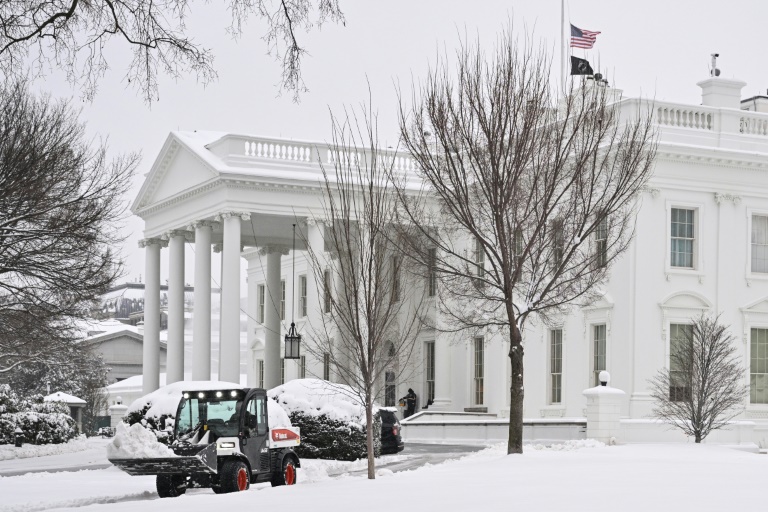Science
Republicans Outpace Democrats in Federal Science Funding

Recent analysis reveals that U.S. Republicans historically allocated more funds to scientific research compared to their Democratic counterparts, despite an increasing skepticism towards science among some Republican leaders in recent years. A study conducted by researchers from Northwestern University examined federal appropriations for science from 1980 to 2020, uncovering significant partisan disparities in funding levels.
The research, led by Dashun Wang and Alexander Furnas from the Kellogg School of Management, highlighted that Republican presidents and House majorities spent more on science-related appropriations during this 40-year period. Utilizing public records from the U.S. Government Publishing Office and the Congressional Budget Office, the team assessed a total of 171 specific appropriations accounts across 27 federal agencies, encompassing a broad definition of science and research.
During the analysis, the researchers noted that science appropriations would typically receive, on average, an additional $150 million when Republicans controlled the House of Representatives and $100 million more under a Republican presidency. The funding encompassed not only research and development but also social science and policy research initiatives related to agencies such as NASA, the Institute for Education Sciences, and the National Institute of Standards and Technology.
Understanding the dynamics of science funding has been a critical motivation behind this research. The authors aim to provide a foundation for future advocacy and policy design surrounding scientific funding. They also express hope that their findings will inspire greater bipartisanship in political discussions related to science.
The research findings are published in the journal Science under the title “Partisan disparities in the funding of science in the United States.” As the nation navigates complex conversations about climate change and public health, the study’s insights into funding trends could play a pivotal role in shaping future policies and collaborative efforts in scientific research.
-

 Education3 months ago
Education3 months agoBrandon University’s Failed $5 Million Project Sparks Oversight Review
-

 Science4 months ago
Science4 months agoMicrosoft Confirms U.S. Law Overrules Canadian Data Sovereignty
-

 Lifestyle3 months ago
Lifestyle3 months agoWinnipeg Celebrates Culinary Creativity During Le Burger Week 2025
-

 Health4 months ago
Health4 months agoMontreal’s Groupe Marcelle Leads Canadian Cosmetic Industry Growth
-

 Science4 months ago
Science4 months agoTech Innovator Amandipp Singh Transforms Hiring for Disabled
-

 Technology3 months ago
Technology3 months agoDragon Ball: Sparking! Zero Launching on Switch and Switch 2 This November
-

 Education3 months ago
Education3 months agoRed River College Launches New Programs to Address Industry Needs
-

 Technology4 months ago
Technology4 months agoGoogle Pixel 10 Pro Fold Specs Unveiled Ahead of Launch
-

 Business3 months ago
Business3 months agoRocket Lab Reports Strong Q2 2025 Revenue Growth and Future Plans
-

 Technology2 months ago
Technology2 months agoDiscord Faces Serious Security Breach Affecting Millions
-

 Education3 months ago
Education3 months agoAlberta Teachers’ Strike: Potential Impacts on Students and Families
-

 Science3 months ago
Science3 months agoChina’s Wukong Spacesuit Sets New Standard for AI in Space
-

 Education3 months ago
Education3 months agoNew SĆIȺNEW̱ SṮEȽIṮḴEȽ Elementary Opens in Langford for 2025/2026 Year
-

 Technology4 months ago
Technology4 months agoWorld of Warcraft Players Buzz Over 19-Quest Bee Challenge
-

 Business4 months ago
Business4 months agoNew Estimates Reveal ChatGPT-5 Energy Use Could Soar
-

 Business3 months ago
Business3 months agoDawson City Residents Rally Around Buy Canadian Movement
-

 Technology2 months ago
Technology2 months agoHuawei MatePad 12X Redefines Tablet Experience for Professionals
-

 Business3 months ago
Business3 months agoBNA Brewing to Open New Bowling Alley in Downtown Penticton
-

 Technology4 months ago
Technology4 months agoFuture Entertainment Launches DDoD with Gameplay Trailer Showcase
-

 Technology4 months ago
Technology4 months agoGlobal Launch of Ragnarok M: Classic Set for September 3, 2025
-

 Technology4 months ago
Technology4 months agoInnovative 140W GaN Travel Adapter Combines Power and Convenience
-

 Science4 months ago
Science4 months agoXi Labs Innovates with New AI Operating System Set for 2025 Launch
-

 Top Stories2 months ago
Top Stories2 months agoBlue Jays Shift José Berríos to Bullpen Ahead of Playoffs
-

 Technology4 months ago
Technology4 months agoNew IDR01 Smart Ring Offers Advanced Sports Tracking for $169










